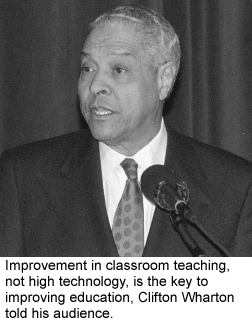The University Record, April 22, 1997
Computers won’t solve the nation’s education problems, Wharton says
By Jared Blank
 Clifton Wharton doesn’t believe that computers will solve the fundamental educational problems facing American youths. At a recent address in Rackham Amphitheater, the former president of Michigan State University and chairman and CEO of TIAA-CREF discussed the importance of preparing primary and secondary school students for growing global marketplace of ideas: “The move toward greater globalization,” he said, “is inexorable.”
Clifton Wharton doesn’t believe that computers will solve the fundamental educational problems facing American youths. At a recent address in Rackham Amphitheater, the former president of Michigan State University and chairman and CEO of TIAA-CREF discussed the importance of preparing primary and secondary school students for growing global marketplace of ideas: “The move toward greater globalization,” he said, “is inexorable.”
Wharton said that education reform must begin in primary schools because the future success of students is “often determined by their pre-college education.” He added that the best way to improve K-12 education is by improving classroom teaching. “I hope computers will not become the universal answer to pedagogy, because if students can’t write or read well, the Internet is not going to serve as a substitute.”
Not only do computers not replace teaching, he said, computers cannot re-create other benefits of attending a class with other students, including a feeling of classroom warmth, experimentation and classmate interaction outside of class.
Once students enter college, they face economic challenges, a constant “upward spiral” of tuition costs, Wharton said. “While elitism or other artificial constraints on college entry in the United States have virtually disappeared, the one great obstacle that remains is cost.” He warned against creating a “generation of debtors” as grants are replaced by loans. “What is even more disturbing to me is that the prospect of escalating levels of debt is creating a major disincentive for pursuing a college degree among the poorest of the poor.” Wharton added that the levels of rural and urban poor will continue to drop even though the poor need education help the most.
Wharton suggested that universities are becoming too insular, that they are not preparing undergraduates for the global economy. He cited the growing attitude that international activities at the undergraduate level are just a “frill.” “Community colleges appear to be recognizing the need for these programs . . . (but) our universities are becoming programmatically more isolationist.”
For example, over the past few years, several Big 10 campuses have eliminated or reduced the scope of their international deans or directors. In addition, foreign area centers have been cut at many universities. Wharton is disappointed that universities are no longer seen as partners with governments and foundations to aid with foreign development.
Wharton added that policy makers must begin to view education as an investment, not an expense.
The lecture was sponsored by the Population-Environment Dynamics Project and the Office of the President.

